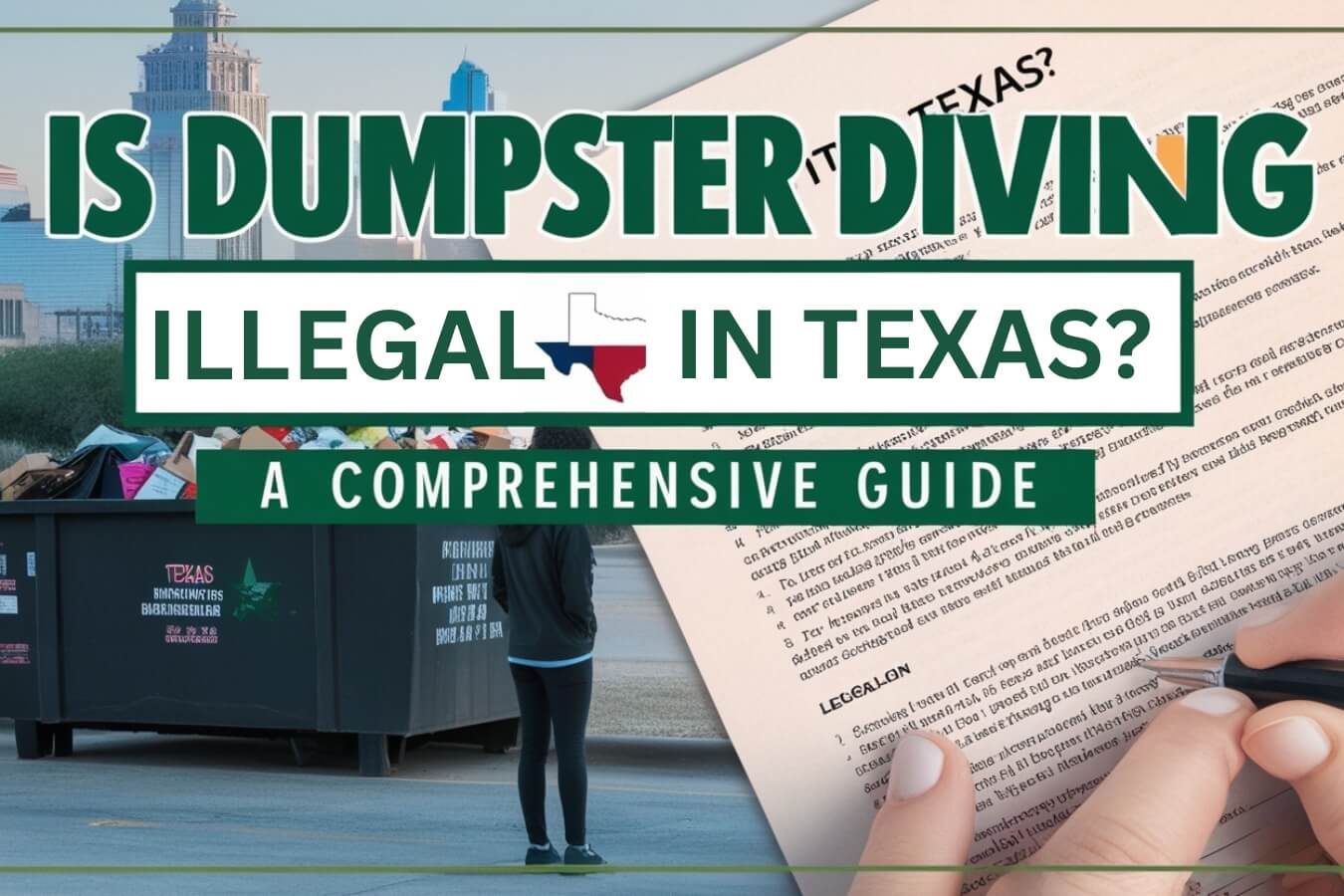Is Dumpster Diving Illegal in Texas? A Comprehensive Guide

Dumpster diving in Texas exists in a legal gray area. While not explicitly illegal statewide, its legality depends on factors like location, property ownership, and local ordinances. Generally, dumpster diving on public property is legal in Texas, but trespassing on private property to access dumpsters can lead to legal trouble. This guide explores the ins and outs of dumpster diving legality in the Lone Star State.
What is Dumpster Diving?
Definition and Overview
Dumpster diving is the practice of searching through commercial, residential, or industrial dumpsters to find usable goods that have been discarded. Despite its name, most modern dumpster diving doesn’t actually involve climbing into dumpsters. Instead, practitioners often use tools to retrieve items or simply reach into accessible containers.
History of Dumpster Diving
The concept of scavenging for discarded items isn’t new. However, the term “dumpster diving” gained popularity in the 1980s, coinciding with growing awareness of wastefulness in consumer society. The practice has roots in the freegan movement, which rejects consumerism and seeks to minimize waste.
Reasons People Dumpster Dive
People dive for various reasons:
- Economic necessity
- Environmental concerns
- Treasure hunting
- Political activism
- Art projects
- Gathering data on waste patterns
Regardless of motivation, it’s crucial to understand the legal landscape in Texas before embarking on a dumpster diving expedition.
The Legal Landscape of Dumpster Diving in Texas
State Laws Regarding Dumpster Diving
Texas doesn’t have specific state laws addressing dumpster diving. This lack of explicit prohibition might lead some to assume it’s always legal, but that’s not the case. The legality often hinges on property laws and local ordinances.
Local Ordinances and Variations
Texas cities and counties may have their own rules about dumpster diving. For example, some municipalities have ordinances against scavenging or “unauthorized collection” of recyclables. Always check local laws before diving.
Property Rights and Trespassing Laws
The biggest legal concern for Texas dumpster divers is trespassing. Under Texas Penal Code § 30.05, entering private property without the owner’s consent can result in criminal trespass charges. This applies even if you’re just accessing a dumpster on private property.
When is Dumpster Diving Legal in Texas?
Public Property Considerations
Dumpster diving on public property is generally legal in Texas. This includes dumpsters in public parks or on sidewalks. However, some public areas may have specific rules against rummaging through trash.
Abandoned Property Laws
In Texas, once something is placed in a dumpster, it’s typically considered abandoned property. However, this doesn’t give you the right to trespass to access that property.
Permission from Property Owners
The safest way to dumpster dive legally in Texas is to get permission from the property owner. Some businesses may be open to allowing diving, especially if you explain your reasons and promise to leave the area clean.
Potential Legal Risks of Dumpster Diving in Texas
Trespassing Charges
The most common legal risk for dumpster divers in Texas is trespassing. If you’re caught on private property without permission, you could face:
- Class C misdemeanor: Up to $500 fine
- Class B misdemeanor: Up to $2,000 fine and 180 days in jail (if the property is agricultural)
- More severe penalties if you have a deadly weapon
Theft Accusations
While items in dumpsters are usually considered abandoned, a business owner might accuse you of theft if they believe you’ve taken something of value. This is rare but possible.
Littering and Vandalism Concerns
If you leave a mess while dumpster diving, you could be charged with littering. Similarly, damaging a dumpster or its surroundings could lead to vandalism charges.
Dumpster Diving Etiquette and Best Practices
Respecting Private Property
Always prioritize respecting private property. If a dumpster is clearly on private land or behind a fence, it’s best to avoid it unless you have explicit permission.
Cleanliness and Safety Precautions
If you do dive, follow these safety tips:
- Wear gloves and sturdy shoes
- Bring a flashlight for visibility
- Never climb into a dumpster
- Leave the area cleaner than you found it
- Be aware of sharp objects or hazardous materials
Time of Day Considerations
Many dumpster divers prefer to work at night for privacy. However, this can look suspicious and may increase your chances of being accused of wrongdoing. Consider diving during daylight hours when businesses are open, and you can ask for permission.
Dumpster Diving Hotspots in Texas
Retail Stores and Shopping Centers
Large retail chains often discard unsold merchandise or slightly damaged goods. However, many now use compactors or locked dumpsters to prevent diving.
College Campuses
At the end of semesters, college students often discard usable items. Some Texas universities have programs to collect and redistribute these items, reducing the need for dumpster diving.
Residential Areas
Apartment complexes can be good spots for finding furniture or household items, especially around moving days. Remember that these are typically private property, so permission is crucial.
Legal Alternatives to Dumpster Diving in Texas
Freecycle and Buy Nothing Groups
Many Texas communities have online groups where people give away unwanted items for free. These provide a legal and safe alternative to dumpster diving.
Thrift Stores and Garage Sales
Texas is known for its excellent thrift stores and frequent garage sales. These offer low-cost alternatives to dumpster diving.
Food Banks and Community Programs
For those diving out of necessity, Texas has numerous food banks and community programs that can provide assistance without legal risks.
Environmental Impact of Dumpster Diving
Reducing Waste and Landfill Usage
Dumpster diving can help reduce the amount of usable goods ending up in landfills. In Texas, where landfill space is a growing concern, this can have a positive environmental impact.
Promoting Recycling and Reuse
Many divers repurpose or upcycle found items, promoting a culture of reuse that aligns with broader environmental goals.
Challenges and Criticisms
Critics argue that dumpster diving doesn’t address the root causes of waste and may even enable wasteful practices. Some Texas businesses claim that diving creates liability issues or attracts pests.
Texas Dumpster Diving Community
Online Forums and Groups
Texas has active online communities dedicated to dumpster diving, where members share tips and experiences. These groups often emphasize legal and ethical practices.
Meetups and Events
Some Texas cities have organized dumpster diving meetups or “trash tours” to educate people about waste and consumption.
Sharing Tips and Experiences
Experienced Texas divers often mentor newcomers, sharing knowledge about local laws, best practices, and productive diving spots.
Frequently Asked Questions About Dumpster Diving in Texas
Is dumpster diving illegal in specific Texas cities?
While not illegal statewide, some Texas cities have ordinances against dumpster diving. Always check local laws before diving in a new area.
Can businesses press charges for dumpster diving?
Yes, if you’re trespassing on private property. Some businesses in Texas have taken legal action against persistent dumpster divers.
What should I do if confronted while dumpster diving?
Remain calm and polite. If asked to leave, do so immediately. Don’t argue or resist, as this could escalate the situation and potentially lead to legal trouble.
Conclusion: Navigating the Gray Areas of Dumpster Diving in Texas
Is dumpster diving illegal in Texas? The answer isn’t straightforward. While not explicitly prohibited by state law, the legality often depends on location, property rights, and local ordinances. Dumpster diving on public property is generally legal, but diving on private property without permission can lead to trespassing charges.
For those interested in dumpster diving in Texas, the key is to be informed and respectful. Research local laws, prioritize safety, and always get permission when diving on private property. Consider legal alternatives like freecycle groups or thrift stores, which offer similar benefits without legal risks.
Ultimately, while dumpster diving can be a way to reduce waste and find useful items, it’s crucial to balance these potential benefits against legal and safety considerations. By understanding the laws and following best practices, Texans can make informed decisions about whether and how to participate in dumpster diving activities.






